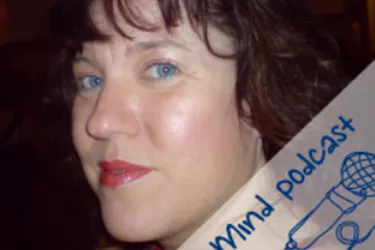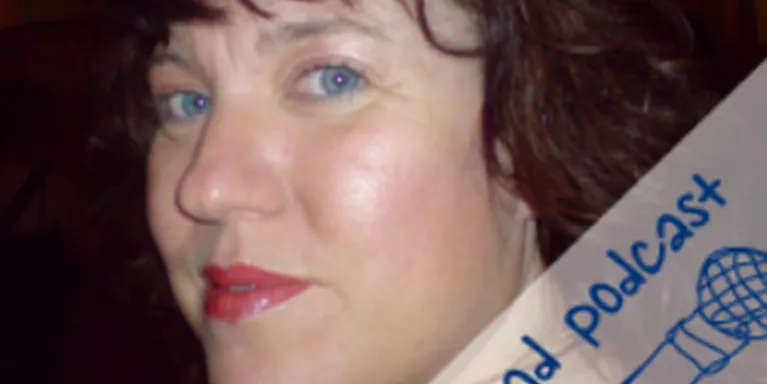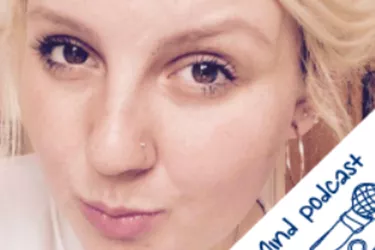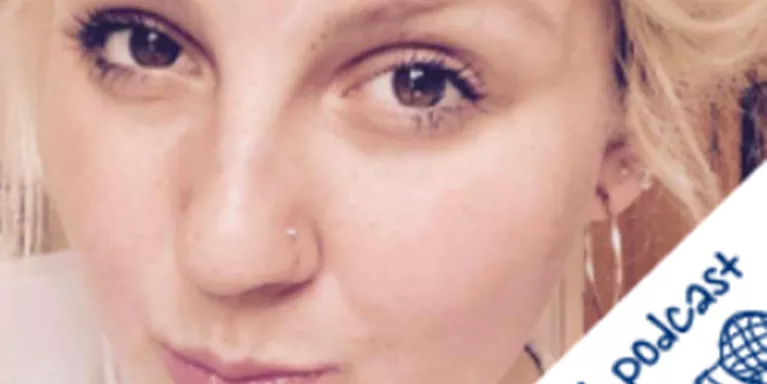Mind podcast - Depression
Christina speaks to us about her life with depression, and how self-help groups were the key to her recovery.
Subscribe to our podcast on iTunes or Audioboom.
If you'd like to find out more about the issues discussed in this podcast, click below:
Matt: Welcome to the Mindcast: depression, and with me today is Christina Young. Christina, how do you feel about the title depression as a description for the illness?
Christina: Totally inadequate. Not only inadequate, but misleading. I’ve heard so many people say that, and I’m saying that from my own experience - who on earth dreamt up the term depression. Because when you say it to the ordinary man or woman in the street, who’s never experienced it, they naturally see it as being fed up, down in the dumps, even in despair. Somebody might be depressed after a bereavement, after losing a job and so on. But that’s different - it’s totally inadequate to describe the absolute hell of what depression, depression illness really is. And at times I did feel suicidal, I really did.
Matt: Could you describe, in your own words, what it feels like to have depression?
Christina: Well in my experience, a depressive illness is a whole range of agonising feelings, from fear, nameless fear, panic, very bad concentration and feelings of isolationeven though I was with people.
Another very frightening feeling was the unreality, where I would feel as though I was becoming disembodied. I knew I wasn’t, but it would feel as though my mind was leaving my body and going into another dimension. I even had sensations at one time as though I was breaking into pieces, as though my arms were dropping off. Again I knew they weren’t, but it was that feeling of disintegration. And then there were all the physical aspects. I had very, very severe exhaustion off and on, I had a bad rash, and headaches, I had severe headaches. And at the other end of the spectrum I also experienced, just a couple of times, what I would think of as pure depression, where I had no anxiety, no fear, but I felt completely emotionally dead, as though my whole stimuli and response mechanism had broken down.
Matt: What do you mean by stimuli and response mechanism?
Christina: Yes, I’m sorry for using technical terms, but it’s about sensations. So a stimuli might be nice smells for example, perhaps food cooking or something, and it brings us pleasure. Sights and sounds bring us pleasure, or sights and sounds which aren’t nice bring us displeasure. And I would be aware of those sights and sounds and physical sensations, like if you touch something, but I didn’t feel any emotion attached to them. So I would hear a loud noise, and usually if you hear a very loud unpleasant noise you think “that’s horrible” and you don’t like it, or if it’s a pleasant noise you do like it; but none of the emotion was present with the sensations.
Matt: How long have you suffered with depressive illness?
Christina: Well I had a very disturbed childhood, it was a very abusive situation. I was an only child and I had very, very strict elderly parents.
My father was 69 when I was born and my mother was nearly 48, they were very, very strict. I mean I honestly think they didn’t intentionally abuse me. But really my illness, what I would call my real depressive illness, started when I was about 20.
And I knew I was ill. It started with the severe anxiety, getting what I would later realise is called panic attacks, but it was a fear, it was a panic.
And then I started getting phobic feelings when I was doing things like going into a shop, going into the church that I attended, going into work - because I had a job, I worked in an office.
So of course that became, it wasn’t just a real problem, it was more than that, it completely took over my life. And, I must say that what added to it was the fact that I realised “oh gosh, I have got a mental problem”. And in those far-off days, having any kind of mental problem was just deemed horrific.
And it was the stigma, but a lot of it was the self-imposed stigma as well that I’d internalised, because I’d been brought up with that if people had any kind of mental illness it was a case of “Oh, you know so-and-so, she’s in an institution” hush, hush you see.
And I had this view that if anybody had a mental illness they would be put in a strait-jacket, that was all I knew about, that was my view. And I thought if anyone knew how ill I was and I was experiencing all these feelings, I would get dragged away, locked up, put in a strait-jacket. And I really believed that so of course that made it a hundred times worse.
Matt: So you didn’t tell anyone?
Christina: I didn’t, except I couldn’t really hide it from my mother, and she was actually sympathetic and said “Oh yes I had a breakdown when I was young, you need plenty of rest to get better”.
Whereas, it really wasn’t a question of plenty of rest; I had very severe, underlying problems. But she didn’t really want to acknowledge that they had started during my abusive childhood you see. But the other thing that made it so difficult and so horrendous was that of course eventually I couldn’t hide it; I was off work, I was too ill, I collapsed, I physically collapsed. I couldn’t go into work. And I’d got involved with some religious extremists who were telling me that “oh, fear and depression, any mental illness, that’s sin”.
But I was very vulnerable and I believed them. So of course I was not only going through this agonising time, but I thought it was my fault because I didn’t have enough faith to be healed, so all this was sin. So I was not only ill, I was terribly sinful to be feeling this. So all this compounded it.
Matt: And when did you start getting help with it?
Christina: Well, this is going back to when I was 20, as I said I’ve had more than one bout of this experience, but I had to go to my GP. And I never actually told any medical professional, GP or otherwise, just how severely ill I was.
I never told them about these delusions, or looking as though things were changing shape, or feeling unreality. I told the bare minimum in order to get my note, because I really was afraid that if I told him the truth, how severe it was, I was afraid that I would be sectioned.
And I think maybe I would have been, so I don’t regret that. But my doctor prescribed sleeping tablets and tranquillisers, well it was valium in those days, diazepam, benzodiazepines, and also sleeping tablets.
And I actually took them regularly, because sleeping was a big problem, I actually took them regularly for about three years. And then later I did start taking the benzodiazepines – the valium it was. And do you know, they are the most helpful drugs I have ever known.
When I eventually felt better and realised I no longer needed the sleeping tablets, and I can distinctly remember the time I thought “you know, I’m feeling a lot better, I don’t need the sleeping tablets tonight, I think I’ll get to sleep without” and I just left them off that like.
I didn’t gradually cut them down or anything, I never had any problems. And with the valium if I didn’t need them I didn’t take them, I never had any withdrawal symptoms, I never had any adverse effects.
For me they have been the most effective drug ever. And occasionally – I don’t need them much now, but occasionally – I do still take them.
Matt: So you self-medicate do you?
Christina: Self-medicating.
Matt: Can I ask you, you said it got so bad that you couldn’t go to work?
Christina: Yes that’s right
Matt: How did people react that you knew, friends of yours. As soon as that happened, as soon as that first day when you were off work – did they bombard you with phone calls, and messages “are you OK Christina?”
Christina: We didn’t have phones in those days, only posh people had phones! No, they were sympathetic, but they just didn’t know what to do.
They wanted to help, you know, friends of the same age or older people, they were all sympathetic, they’d say “how are you”. And then as it went on, I got people giving absolutely useless advice that just made it worse, saying things like “oh you look better, even if you don’t feel you are” – but it is about feeling. And they’d say stupid things like “oh well do something to take your mind off it”. Well, that’s like saying, “oh you’ve got a broken leg, so walk on it”, or “occupy your mind”.
But if your mind is in such a state that you can’t concentrate, because sometimes I didn’t even know who I was, I was unsure who I was. I was unsure where I was, I’d look around, and it would as though the tables and chairs had all changed shape. I mean, you can’t occupy your mind when you’re like that, all you can do is survive.
And some people would say “pull yourself together” which is an absolutely appalling thing to say to anybody, but you see they didn’t understand - and that is why talking about it and raising awareness is so important.
Matt: You say they didn’t know what to do. What did you want them to do?
Christina: Well at that stage I’m really not sure. Later on, when I became more open about my depression and about my mental illness, and after I discovered a self-help group which was really helpful, I wanted people to certainly listen and understand. But at the earlier stages where it was all so new to me I was sort of wanting support and understanding, but on the other hand I was hiding it, so…there was a bit of conflict there really.
Matt: Do you still suffer from depressive illness now?
Christina: Umm, not like I did. The depression and the anxiety that I get now is no longer related to my childhood as it was then, because I’ve worked through all that. When I get it now, it’s much less severe, but it’s more related to perhaps a current event.
Matt: So from your initial couple of depressive episodes to the present day, something’s happened between those that has helped you to feel much better?
Christina: Well the self-help group - I was in work and I picked up a magazine in the waiting room, and it said something about depression and self-help groups. Well I’d never heard of a self-help group, but it was describing someone’s depression and anxiety state. And it listed some of the feelings that I experience. And I thought “Oh gosh, someone understands how I feel here”. And to cut a long story short, yes I went along to this self-help group. And I can honestly say from the moment I walked through the door I thought “this was what I have been looking for”.
Because there was no hierarchical structure, there were no leaders, it was called Depressives Anonymous actually, everyone was experiencing some mental health problem, it could be depression, anxiety state, whatever. And there was a freedom, we used to say “we can take off our masks”. We could talk openly about all the feelings I’ve mentioned, all our experiences, nobody would say “Oh isn’t that awful, why do you feel that?” or “you should do this or that”.
People would listen to each other, and it was the feeling of understanding and acceptance, acceptance was a big thing, and of course with acceptance your self-image and self-esteem goes up.
And we used to go out and have social occasions, go walking and whatever. And I became so involved in that. I was very lucky with the people that I met there actually, some I’m still friends with and that was well over thirty years ago.
And some of them were very into alternative therapies such as Gestalt encounter, primal therapy and so on. And I started to delve into this; I used art and poetry a lot.
I found that when I was being bombarded with very painful, tumultuous feelings I wanted to get the feelings out, so before I would start thinking, or before I could start thinking about “well, why am I feeling like this” or altering my thoughts, which is what you do in cognitive behavioural therapy (which was never any use to me), before I altered the thoughts I had to release the feelings. So I would use various ways of externalising my feelings.
And I realised that by looking at pictures of Van Gogh’s paintings for example, which are (it’s a pity this isn’t visual), but they’re very powerful brush strokes and vibrant colours which depict the turmoil that the painter was feeling.
And I found, I don’t know how I did it, because other people have said they can’t do it, but I used to somehow merge my feelings with the feelings that were portrayed in these paintings, and somehow release my feelings through vicarious catharsis - now I don’t know how I did it, but it worked for me.

Matt: To go back to the self-help group, when you first turned up, was it just a room with lots of chairs and people sat down?
Christina: Well it was in a squat actually, in Liverpool, this really dingy squat up loads of stairs. Well in these days, well it was condemned in those days the building, but a group of anarchists had taken it over and they just let people have rooms.
And it was really dirty and scruffy and I remember we had a one-bar electric fire, which was probably highly dangerous. And we just put a few coppers in to pay for the electric, I don’t think we had any tea-making facilities. It was really scruffy and dirty, and there were some cushions around and some rickety chairs.
But the environment didn’t matter in the least, it was the people who were there, and they were a brilliant lot, they were really weird and wonderful, which was what I liked. And they all had mental health problems, they were really eccentric, and it was absolutely brilliant. I just loved it. And that really did help me to get better. I still took the drugs if I needed to, the medication, and used other coping strategies.
But it really helped me because I could talk to the greatest depth that I ever had, because everybody, as I’ve said, it was a case of other people took their masks off. People talked about their childhoods and so on. Some had had happy childhoods but most had had some kind of abusive childhood, and it helped me to work through the feelings and the effects of my childhood. That was very important, because that’s what was causing my mental health problems.
Matt: If someone’s listening right now, and they’ve got a friend who’s just experiencing what they suspect may be depression, what advice would you give to them?
Christina: To show what is ordinary care and compassion. The care and compassion they would show with anyone. If somebody had a physical illness they would be compassionate towards them, so I would say to do that.
To ask how the person is feeling, certainly to listen, not to be judgemental and not to tell the person what to do. Because, with all the will in the world, you could say the wrong thing.
For example, saying “do something to take your mind off it, occupy your mind” – that could be the worst thing. “Make a bit of effort” - again, the wrong thing. So I would say don’t be judgmental, certainly listen to the person and show compassion. And also, get some information for the person, that’s important.
Matt: So, it seems to me, the thing that’s helped you the most has been talking, would you agree?
Christina: Yes, talking openly, but with people who are accepting and understanding. Not just any kind of talking, that’s the key issue. And I’ll tell you something else which certainly helped me, because I really was obsessed with, even after I got better, I was obsessed with a feeling of shame. It is so illogical and so unrealistic, because if you have appendicitis or you break your leg, you don’t feel ashamed of it. If you have a physical illness, you don’t feel ashamed of it do you? So why feel ashamed if because you have a mental health problem?
Matt: Christina, thank you for taking the time and sharing your fascinating story with us.
Christina: You’re very welcome.

Information and support
When you’re living with a mental health problem, or supporting someone who is, having access to the right information - about a condition, treatment options, or practical issues - is vital. Visit our information pages to find out more.
Share your story with others
Blogs and stories can show that people with mental health problems are cared about, understood and listened to. We can use it to challenge the status quo and change attitudes.















